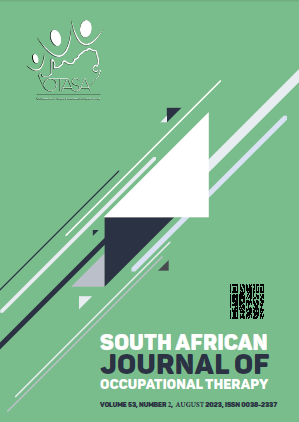Comparing the impact of two occupational therapy interventions on academic learning outcomes for children with Human Immunodeficiency Virus
DOI:
https://doi.org/10.17159/2310-3833/2023/vol53n2a7Keywords:
HIV-positive children, Griffiths Mental Developmental Scales, Beery-Buktenica Visual Motor Integration, Learning as an occupational outcome, Play-informed, Caregiver-implemented, Home-based interventionAbstract
Introduction: The strong association between perinatal HIV infection and poor performance in academic learning is further challenged by various barriers to learning in the South African context of basic education. This study investigated the efficacy of a novel play-informed, caregiver-implemented, home-based intervention (PICIHBI) for improving academic learning in HIV-positive children
Methods: A single-blinded, randomised comparison group design was selected to compare PICHIBI with conventional one-on-one occupational therapy interventions. Children with HIV aged 5 to 8 years old on ART and their primary caregiver (N=23) were randomly allocated to an intervention group. The primary outcome of academic learning was measured using the Griffiths Mental Developmental Scales-Extended Revised and the short form Beery-Buktenica Visual Motor Integration test, 5th edition at baseline, mid (5 months) and post-intervention (after 10 months
Results: At baseline, the total sample (n=23) presented with below-average performance in all assessed academic learning outcomes. Between-group differences for all academic learning outcomes were not significant at mid or post-test assessment points. A statistically significant within-group change in visual motor integration was noted in the PICIHBI from baseline to mid-test (p=.019). In the conventional group, there were statistically significant changes in visual perception from baseline to mid (p=.001) and baseline to post-test (p=.009). The sub scale Performance in the conventional group improved significantly from baseline to mid-test (p=.027
Conclusion: While improvements were noted, children in both groups continued to present with academic learning concerns at post-test. These concerns motivate the need for continued monitoring and further investigation into the feasibility and effectiveness of occupational therapy interventions targeting the academic learning challenges of this population.
IMPLICATIONS FOR PRACTICE:
This paper adds to an emerging body of evidence aiming to demonstrate the effect of occupational therapy interventions on occupational outcomes for children with perinatal HIV infection. The paper presents a detailed overview of the conceptualisation of learning as an occupational outcome. The paper further presents consideration of the practical challenges linked to the implementation of, adherence to and sustainability of rehabilitation interventions in low to middle-income countries.
Downloads
References
See PDF for full list of References
Downloads
Published
Issue
Section
License
Copyright (c) 2023 South African Journal of Occupational Therapy

This work is licensed under a Creative Commons Attribution-NonCommercial-NoDerivatives 4.0 International License.
How to Cite
- Abstract 112
- PDF 69




.png)